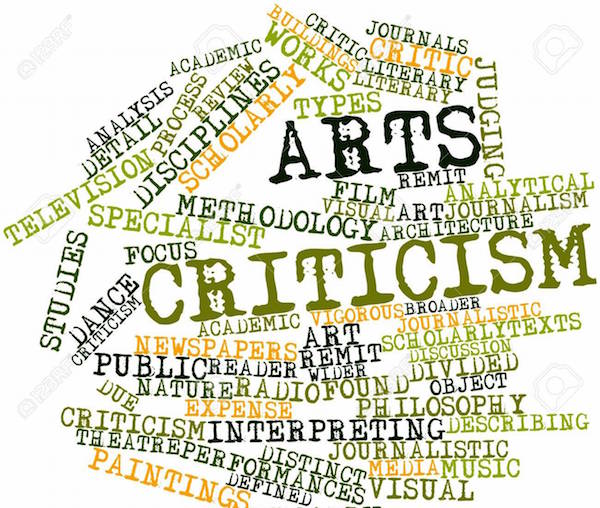For the Love of Arts Criticism: An Invitation for the Arts Community to Speak Out – and to Act
The publication, its editor, and its over 60 writers believe that the health of arts criticism and the arts community are inextricably intertwined.

By Bill Marx
As I promised in my recent column, a heated response to the Boston Globe’s cutting its freelance theater critics, The Arts Fuse is initiating a series of monthly discussions (the final Mondays in February, March, and April) on the fragile state of theater and arts criticism, particularly in our mainstream media: The Boston Globe, WGBH, and WBUR.
The first talk took place on February 26th at Burnes Hall (located in NEC’s new Student Life & Performance Center at 255 St Botolph Street).
The Arts Fuse, its editor, and its over 60 writers believe that the health of arts criticism and the arts community are inextricably intertwined. Succoring one is a mitzvah for the other. It is time to fight for more critical dialogue and less happy talk.
The evening was made up of three parts. I begin talking about the history of arts criticism in Boston (it has not always been so grim). Then I sketched out a vision of what criticism does, at its best, concluding by making a rousing case for why we need more (and better) critics to cover our rapidly expanding cultural scene. After that, fellow reviewers and members of the arts community were invited to speak about how criticism has made a valuable contribution to their career and/or their art. Next, attendees were encouraged to take part in a discussion aimed at coming up with a response to the current situation. The result was passionate claims made for the value of arts criticism and a lively exchange of views.
The video of the February 26 discussion, generously recorded by HowlRound:
Bill Marx is the editor-in-chief of The Arts Fuse. For over three decades, he has written about arts and culture for print, broadcast, and online. He has regularly reviewed theater for National Public Radio Station WBUR and The Boston Globe. He created and edited WBUR Online Arts, a cultural webzine that in 2004 won an Online Journalism Award for Specialty Journalism. In 2007 he created The Arts Fuse, an online magazine dedicated to covering arts and culture in Boston and throughout New England.

I want to attend so badly, as a lifelong Boston arts administrator and consulting alumnus of the Mayor’s office of cultural affairs and Mass. Council for the Arts, now doing concert programming, cultural publishing and other things — but outside of Boston so cannot attend. If you do any video or podcast of discussions I’d love to receive them! Good luck – from we who care passionately about quality journalism, free press, facts, truth, investigative reporting; and thriving arts organizations; in arts advocacy, education and support in every form.
In appreciation,
Lynn
Hi Lynn:
We are going to videotape the discussion, and I will post it on the magazine. Also, I hope to have two more rallies, one at the end of March the other at the end of April … perhaps you can make one of them.
While reading your Arts Fuse item about the importance and value of arts criticism, I was reminded that some years ago there was an exhilarating conference at Harvard’s Kennedy School, sponsored at least in part by the Neiman Foundation, on the very subject of journalism and arts criticism, with some heavy-hitting journalists and critics. My most constructive suggestion is that it may be time to have another such conference, with an even higher profile, to continue the conversation.
The other thought is that the value of arts criticism is multi-fold: Yes, it informs the general public/readership about the production, ideally with enough information properly provided to be a reliable guide regarding whether or not you’d want to attend. Even with a less-than-laudatory assessment, there may be described elements indicating that a particular person would still want to attend. There’s also the value of learning from reading criticism, shaping and educating audience perspective for a richer, even more demanding, experience, building excellence in players and playgoers so they’re open to more and more diverse material. With new plays and try-outs, intelligent criticism also is exceedingly valuable to the creators of the new piece, say, in highlighting what works or doesn’t work with particularity and examples. Lastly, although media criticism can be in old-fashioned paper format or a newspaper’s website online, older folk who are less mobile or have limited means can often “feel like they’re there” or “as though participating in the experience” by reading well-written criticism that aims high in literary as well as analytical terms. This rejuvenative aspect of criticism (perhaps, leading to socialization at senior centers) may be minor but this demographic is more likely to be among regular readers. Come to think of it, this last aspect may be potentially relevant to any non- or casual theatregoers, spurring attendance down the road actually rather than vicariously.
There also needs to be more initiative – done currently at many nonprofit theatre groups – to bring younger generations into theatergoing on a regular basis. But that may be a separate discussion.
Just some thoughts on your certainly worthy endeavors here.